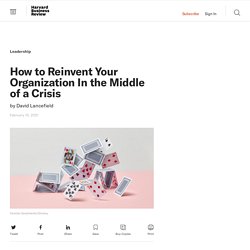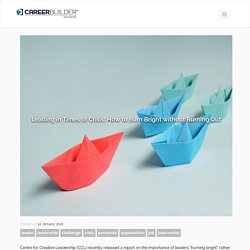

Planning Your Post-Pandemic Future. It feels strange to think about the future from here.

We’ve been collectively enduring an imposed and unenjoyable present for a considerable period of time now. It’s been a year that has felt both interminable and yet blindingly fast at the same time. Time seems to take forever to pass, but we’re not wholly certain where it has all gone. While it will be a delight to move beyond the bounds of the pandemic, doing so feels a little surreal after such a lengthy period of living in-between.
Liminality is a place of transition. As we contemplate re-emergence into the world after a protracted period of liminality, there are opportunities to be explored about what that future looks like and how we would like it to unfold. You might be looking at all of this and sincerely questioning my sanity, and the degree to which there is any opportunity to be realized in our current voyage through the between and betwixt. LinkedIn by Jurgen Appelo. On demand webinar: Change Management in Turbulent Times: Managing Unexpected,Ongoing Change During COVID & Other Crises. On demand webinar: A Leader's Guide to Navigating Involuntary Changes. 3 Easy Tips To Stay Calm And Focused During A Crisis.
Crisis Innovation: Build Capability, Seize Opportunity. Wharton@Work Crisis-driven innovation has a long history.

Atypical circumstances such as wars and economic downturns create new needs, which in turn lead to new solutions — the radio, stainless steel, and Toyota’s lean manufacturing process are just a few stand-out examples. Wharton professor and Vice Dean of Innovation and Entrepreneurship Karl Ulrich says today the pandemic is no different, and the move from crisis stage to a “new normal” is engendering a new set of needs to meet. “Wharton’s dean recently stated, I think correctly, that we have an opportunity to take advantage of everything we've learned from the pandemic and to roll it into business as usual.
That’s also true for other organizations.” But for many companies, taking advantage of those opportunities requires capabilities that, ironically, have been hampered by the very circumstances they seek to find solutions for. “Things we counted on happening organically require more structure and process,” says Ulrich. Does Your Company Lurch From Crisis to Crisis? Many organizations find themselves in a perpetual state of crisis and rely on company “heroes” to put out the fires.

While many people love the feeling of saving the day, it shouldn’t be a way of life. If you’ve wondered why your organization performs... I recently sat in on an executive team meeting during which they were dealing with a crisis — a major customer shipment had been botched. The team was in triage mode to minimize the damage, make amends with the customer, and get things back on track. By the end of the meeting, the team was mobilized and ready to execute. How to Reinvent Your Organization In the Middle of a Crisis. Crises typically meet a “ragged end,” so it’s on leaders to make an informed judgment about when to shift from crisis management to reflection and preparation.

While it’s tempting to want to stabilize your organization at this point, this ongoing... Leading Through Crisis. The Coronavirus pandemic is a reminder of how rapidly things can change and, for businesses, a reminder of the need to be able to move with speed and agility.

For C-suite executives leading through crisis, the challenges in these highly uncertain environments are many and there is no playbook about how to respond. When the context is changing exponentially, it is almost impossible to time your response appropriately – too early and you may contribute to alarmist panic. Too late and your complacency could have significant consequences. Achieving the right intensity and tone for the response are equally difficult. In addition to making the right decisions for the specific situation, leaders also need to provide confidence, reduce anxiety, and generally help employees function with some level of normalcy.
Leading in Times of Crisis: How to Burn Bright without Burning Out. Leading in Times of Crisis: How to Burn Bright without Burning Out Centre for Creative Leadership (CCL) recently released a report on the importance of leaders “burning bright” rather than “burning out” as they face the current challenges.

As representatives of their organisations, employees and stakeholders alike look to leaders for vital clues about how to feel, think and act in the face of the pandemic. While it is easy to advise leaders to “think positively” or “rise to the challenge”, what does that really mean? Leading With Crisis as Your Copilot. Topics Column Our expert columnists offer opinion and analysis on important issues facing modern businesses and managers.

See All Articles in This Series When all the noxious dust has settled on this abominable annum, which companies will be able to count 2020 as a success? Crisis management team: the 5 roles you’ll need in the future. 1.

Head of technology From barricading against cyberattacks, to bolstering customer service through artificial intelligence (AI), the coronavirus pandemic has resulted in wider priorities for the head of technology as part of a crisis management team. A crisis leadership model. Stuck - Crises are the ideal time to make big changes to create a better future. So why aren't companies making them? Toolkit - Transformational Communication Through a Time of Crisis. What a Crisis Teaches Us About Innovation.
1.

H. Omer and N. Alon, “The Continuity Principle: A Unified Approach to Disaster and Trauma,” American Journal of Community Psychology 22, no. 2 (April 1994): 273-287. 2. Transformation Imperative - How to Transform Amid a Crisis. About Boston Consulting Group Boston Consulting Group partners with leaders in business and society to tackle their most important challenges and capture their greatest opportunities.

BCG was the pioneer in business strategy when it was founded in 1963. Today, we help clients with total transformation—inspiring complex change, enabling organizations to grow, building competitive advantage, and driving bottom-line impact. To succeed, organizations must blend digital and human capabilities. Transforming leadership style to succeed during crisis. For senior executives to steer their organisations effectively through the coronavirus pandemic and its aftermath, they will require a range of remote leadership skills that in some cases will have to be learnt as they go along. According to Elizabeth Stewart, partner and head of executive assessment and development at executive search firm Odgers Berndtson, there are three key stages to consider, each of which necessitates its own set of leadership styles and behaviours.
The first involves leaders steadying the ship during the onset of the crisis and making decisions at speed as they set a new course for the company. Part of this process entails establishing the organisation’s key principles and priorities to act as the basis of an action plan for managers to execute. Important remote leadership skills include communicating openly and acting decisively.
Crisis Response: Insights From A Leadership Team Who Did It Well. By Jimmy Leppert, Managing Director + Rod Walker, President of Consulting In the world of complex changes, a global pandemic easily outranks any number of other highly nuanced circumstances that organizations must maneuver within and around. For some organizations, Covid-19 came crashing down in the middle of pre-existing turmoil.
For an organization in the oil and gas sector, the timing collided with in-flight transformation efforts toward becoming a more agile organization amid historically low oil and gas markets, workforce reductions and now – Covid-19. Yet, incredibly, this organization’s crisis response to the pandemic are examples of what leaders should do when navigating the murky early stages of any crisis.
Their behaviors, actions and mindsets enabled the organization to establish a new normal and drive value – right now and into the future. How to lead in a crisis. Responding to Crises With Speed and Agility. Etsy is a U.S. -based e-commerce company best known for connecting individual crafters and artisans directly with consumers. But when CEO Josh Silverman heard in early April that face masks would be a key component of the general public’s fight against the coronavirus pandemic, he mobilized sellers — fast.
Within days of the release of public health guidelines, Etsy had more than 20,000 sellers with masks ready for purchase. As Silverman put it, “It’s as if we woke up and it was suddenly Cyber Monday, but everyone in the world wanted only one product, and it was a product that basically didn’t exist two weeks before.” This example highlights two interdependent drivers that have permeated the global business environment during the pandemic: speed and agility. Research Updates From MIT SMR. Business Rewired: The Secret to Managing Unexpected Change in an Age of Chaotic Change (23 October 2020) by Yoav Tchelet.
Why communication is key in a crisis. The coronavirus outbreak has amplified the need for organisations to provide fast, insightful and transparent communications during a crisis. Though much resilience planning has focused on enabling employees to work from home securely and productively, and ensuring businesses can operate at distance, it is communication with staff, stakeholders and customers that is truly defining those who have adapted most effectively to the pandemic. “Health concerns, job security, economic turmoil; it’s a challenging time to operate,” says Shalen Sehgal, managing director at Crises Control, a disruptor in the mass-notification market, whose mission is to democratise access to mass-notification engines.
Innovate with Urgency — Even When There’s No Crisis. Executive Summary We’ve seen that we can innovate quickly when we’re faced with a major existential crisis like the coronavirus, but how do senior leaders create a sense of urgency for major innovations like systems introductions, new product rollouts, major process shifts, and the like?
Because the truth is that these major change initiatives are urgent and existential; it’s just that they don’t always feel that way. There are three ways leaders can make that sense of urgency more apparent: 1) Engage in small experiments; 2) Set “zesty” goals; and 3) Get personally involved. In the past few months, we’ve seen a stark contrast between the modest pace of typical change management projects and the rapid innovation that is stimulated by a crisis. Take, for example, a large retailer that in 2018 began working on the concept of curbside pickup as a way to reinvigorate deteriorating sales. This emotional and existential pressure is often much weaker or missing in organized change efforts.
Aiming ADKAR at Today's Change Challenges (On demand webinar) It’s Time to Get Comfortable Leading in a Crisis. In June, I had the opportunity to deliver the opening virtual keynote at a Finance Executives International conference. The organization asked me to speak about navigating chaos in uncertain times. As I prepared my presentation, I realized that the leadership principles I’ve been interested in for a while now—ones that draw on the findings of psychology researchers more than management “gurus”—are more important to master than ever. How Transformative CEOs Lead in a Crisis. The COVID-19 pandemic has changed many aspects of business, but one thing that hasn’t changed is the urgent need for companies to transform. Innovation in a crisis: Why it is more critical than ever. John F. Kennedy once observed that the word “crisis” in Chinese is composed of two characters—one representing danger, the other opportunity.
He may not have been entirely correct on the linguistics, but the sentiment is true enough: a crisis presents a choice. This is particularly true today. The COVID-19 pandemic has upended nearly every aspect of life, from the personal (how people live and work) to the professional (how companies interact with their customers, how customers choose and purchase products and services, how supply chains deliver them). Personality and Leading Through a Crisis.
Driving and sustaining change programs in times of crisis. Quand la crise permet d’apprendre et de se recentrer, tant comme organisation que comme humain. L’humanité a déjà vécu plusieurs grandes crises et celle-ci est loin d’être la pire. Mais un élément ressort : jamais nous n’avons autant réfléchi aux différents enjeux qu’elle soulève. Une belle occasion d’en tirer des apprentissages et de repartir sur de nouvelles bases. Notre conviction profonde est la suivante : une organisation va aussi loin que ses leaders sont en mesure de se remettre en question et d’évoluer eux-mêmes. Au fil de nos discussions dans les derniers mois avec des leaders, chefs d’entreprise, chercheurs, politiciens, partenaires, collègues, citoyens, plusieurs axes de réflexion ont vu le jour, sous l’impulsion de la situation inédite que nous vivons. Crisis leadership: An agenda for troubled times. Innovation in a crisis: Why it is more critical than ever.
Watch: Simon Sinek on How to Lead Through Crisis and Change. Simon Sinek is still asking why. The best-selling author of books including The Infinite Game and Find Your Why knows that what separates leaders and innovators from everybody else often comes down to identifying why they do what they do. Sinek recently participated in Inc.' Simon Sinek on How to Lead in a Crisis. Even in tough times, Simon Sinek is an optimist. Navigating Crisis as a Senior Leader: An Interview with Bryan Fontaine. Changement de crise. Les organisations à l'épreuve du covid-19 (2020) par David Autissier, Jean-Marie Peretti et Charles-Henri Besseyre des Horts.
7 Tips for Communicating with Your Employees in Times of Distress. In my last post, I explored the question: What is it that people need at work to remain productive and successful during times of distress? In it, I also discussed the value and critical importance of ongoing feedback and action taking, especially in uncertain times. Crisis Management- How organizations can counter unforeseen times. Who should be on your COVID-19 task force? We asked IBM, Amazon, and Blue Shield. Good Leaders Can Overcome Institutional Inertia in a Crisis. Executive Summary The pandemic is showing us which countries have good leaders, as the very different experiences of Lombardy and Veneto in Northern Italy illustrate. But the leaders history will celebrate most will be those who managed to leverage the burning platform by improving their countries’ institutional infrastructures as well as acting and communicating effectively in the moment. Lessons from the generals: Decisive action amid the chaos of crisis.
Conversations of Change (Dr Jen Frahm) Webinaire sur demande : Les communications et la gestion du changement en contexte de pandémie et de transition. Communicating in a Crisis. An Email From Delta's CEO Shows How to Lead During a Crisis. La recette miracle des communications en temps de crise. Accelerating through the turn - Our point of view on preparing for a future beyond the crisis.
From surviving to thriving: Business after coronavirus. Resuming Transformation Programs. The Post-Crisis Era. How CEOs Can Support Employee Mental Health in a Crisis. Crisis Communication Strategies: How to Prepare in Advance, Respond Effectively and Recover in Full (2020) by Amanda Coleman. COVID-19: Recovery of organizations and supply chains. General James Mattis on leading in a crisis and thriving in the next normal.
Comment se préparer à créer plus de valeur dans la nouvelle normalité? Beyond Today’s Crisis: HR Shifts The Culture Of Midsize Businesses To The “Next Normal” La crise comme levier pour accélérer la transformation culturelle. But it is a call for endurance. What Post-Recession Winners Know And Do. Leading Your Team Past the Peak of a Crisis. Are You Leading Through the Crisis … or Managing the Response? How to help employees learn new skills amid a crisis. How to respond when a crisis becomes the new normal. Winning the coronavirus war. How to respond when a crisis becomes the new normal. The Psychology Behind Effective Crisis Leadership.
How to Manage Change in a Crisis With No Time to Plan. When Crisis Strikes, Lead With Humanity. Learning from Crisis Mode. Finding the Right Words in a Crisis. What Good Leadership Looks Like During This Pandemic. A leader's guide to crisis communication during coronavirus. Will You Be Ready When the Next Disaster Strikes?
Infographic: How Leaders Can Help Shape The Employee Experience in Times of Crisis. Leading During Crisis: Is Your Change Intelligence® Helping or Hurting? Leading Out of Adversity. Managing Crises in the Short and Long Term. In a crisis, companies must know their purpose. Leveraging the gift of crisis. Managing Change in Uncertain Times with Jason Little. To weather a crisis, build a network of teams. Leading and Responding to Change in the Face of COVID-19. How to Lead Through the COVID-19 Crisis and Aftermath. COVID-19 Response: Big Decisions for CEOs Right Now—and Urgent Questions About the Time After.
Gestionnaire à distance en temps de crise : guide de survie aux nouveaux défis. Leading Through Crisis (Part3) COVID-19: What Employees Need From Leaders Right Now. 10 Things to Say to Your Team Right Now. Don’t Hide Bad News in Times of Crisis. Responding to coronavirus: The minimum viable nerve center. COVID-19 Coronavirus Action Guide - How to manage amid chaos, ambiguity and fear. En période de crise, choisissez-vous la survie ou la réinvention? Beyond the Coronavirus Crisis: Prepare Now. Plan-ahead teams: Getting ahead of the next stage of the crisis. Communicating Through the Coronavirus Crisis. 10 tips to help your business communicate during the coronavirus crisis. Resources for Crisis-Related Change.